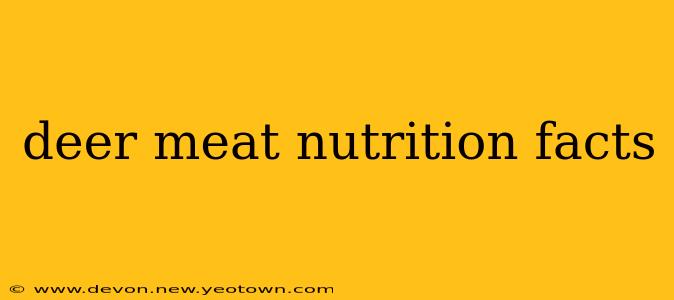For centuries, deer meat, also known as venison, has been a prized source of protein for many cultures. Beyond its rich history, venison boasts a remarkable nutritional profile that makes it a standout choice for health-conscious individuals. Let's delve into the nutritional facts and explore why venison deserves a place on your plate.
What are the Nutritional Benefits of Venison?
Venison is lean, packed with protein, and relatively low in fat, making it a fantastic alternative to other red meats. Imagine a succulent steak, but with a significantly lower calorie count and a higher concentration of essential nutrients. That's the allure of venison. It's a nutritional powerhouse offering a significant amount of iron, zinc, and B vitamins, all crucial for maintaining good health.
How Does Venison Compare to Other Meats?
Compared to beef, venison boasts a significantly lower fat content, particularly saturated fat, which is linked to heart disease. This leanness translates to fewer calories per serving. While both offer impressive protein content, venison often edges out beef in terms of certain essential micronutrients like iron and zinc. Poultry, such as chicken and turkey, also provides lean protein, but venison surpasses them in iron and zinc content, adding another layer of nutritional advantage.
Is Venison High in Protein?
Absolutely! Venison is an exceptional source of high-quality protein, essential for building and repairing tissues, supporting immune function, and maintaining overall health. A 3-ounce serving of venison can provide up to 20 grams of protein, contributing significantly to your daily protein requirements.
What are the Health Benefits of Eating Venison?
The nutritional composition of venison translates into a multitude of health benefits. Its lean nature supports heart health by contributing less saturated fat to the diet. The high iron content combats iron deficiency anemia, a condition characterized by fatigue and weakness. The abundance of zinc bolsters the immune system and supports wound healing. The B vitamins contribute to energy production and nerve function.
What are the potential drawbacks of eating venison?
While largely beneficial, it's important to note a few potential considerations. Venison can be higher in cholesterol than some other protein sources, so individuals with high cholesterol should consume it in moderation. Also, sourcing venison responsibly is crucial. Wild venison should come from trusted suppliers to ensure it is free of parasites and contaminants. Proper cooking methods are also key to eliminate any potential risks.
How much venison should I eat per week?
The recommended serving size of venison, like any meat, depends on individual dietary needs and caloric goals. A general guideline suggests incorporating lean protein sources, including venison, as part of a balanced diet. Consult a nutritionist or dietitian to determine the optimal amount for your specific circumstances.
How can I prepare venison?
Venison is incredibly versatile! It can be grilled, roasted, pan-fried, or slow-cooked, allowing for a multitude of flavorful preparations. Marinades can help tenderize the meat and enhance its taste. Numerous recipes showcasing venison's culinary potential are readily available online and in cookbooks. Experimentation is key to discovering your favorite venison dishes.
This exploration of venison's nutritional profile highlights its status as a healthy and delicious alternative to other meats. By making informed choices about sourcing and preparation, you can fully reap the benefits of this wild delicacy. Remember, a balanced diet and lifestyle are always crucial for optimal health.

